Peter MALONE
Saturday, 18 September 2021 20:00
Four Horsemen of the Apocalypse, The/ 1921
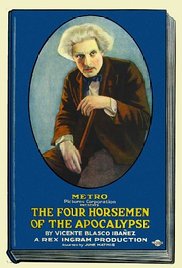
THE FOUR HORSEMEN OF THE APOCALYPSE
US, 1921, 150 minutes, Black and white/Tints.
Pomeroy Cannon, Josephs Swickard, Bridget Clark, Rudolph Valentino, Virginia Warwick, Alan Hale, Alice Terry.
Directed by Rex Ingram.
This film is considered a classic of silent cinema, one of the major films of its director, Rex Ingram, preserved in 1995 by the American National Registry.
It comes only a few years after the fall-length feature films of D.W. Griffith, Birth of a Nation and Intolerance. It is quite a lavish production, a lengthy running time, the sequences with various colours tints. In the 1990s, composer Carl Davis provided a musical score to accompany the restored print.
The film is based on the famous novel by Vicente Blasco Ibanez. (It was filmed again in 1960, given lavish Cinemascope production values and the plot updated from World War I to World War II.)
The film opens in Argentina with praise of this new world, with many migrants from the old world, setting up properties on the pampas, exporting cattle to Europe, growing in wealth, bringing up their families. However, some of the next generation chose to return to Europe, one a family with French origins, the other with German origins. The film tends to focus on the family and friends prior to World War I although the Germans visit France.
The captions give quite a deal of information about the plot and motivations, especially the explanation about the origins of World War I and its consequences.
The title comes from the Book of Revelation, the famous Four Horsemen, bringing death, destruction and plague – and they are visualised at times throughout this film.
The film takes a stance against war, highlighting the futility, with the pessimistic ending of the French son and the German son together, being killed.
The film was an early career step four Rudolph Valentino, moving to his Sheikh films, and dead by 1926. .Alice Terry is Marguerite with whom the French son has an affair. A young Alan Hale is the German son-in-law.
It is important to realise that, while the film looks like a historical film now, it was very contemporary in its time, being filmed within two years of the end of World War I and the Armistice. This history was very recent and appreciated by the audience, as well is its style and look.
1. The film in its time, popular, the cast, the beginning of Valentino’s career?
2. The film becoming a cult classic, 1995 and preserved on the National Registry?
3. Production values, the writer, June Mathis, the director and his career, the length of the film, location photography, studio, the Argentinian setting, the transition to Paris, Paris society, World War I, warfare, the consequences of war? The variety of tints for the sequences? Carl Davis’s adding the musical score?
4. The title, coming from Vicente Blasco Ibanez’s novel, the reference to the scriptural Book of Revelation, the breaking of the seal, the four Horsemen bringing death and destruction? The visualising of the Horsemen throughout the film?
5. The role of the subtitles, the captions, explaining plot developments and character?
6. Argentina, the migrants from Europe, the pampas, the spreads, cattle, exports, the building up of wealth? Family’s deciding to return to their cultures, to Europe, France and Germany?
7. Madariaga, his success, his wife, the daughters, their husbands, his favouring French culture rather than German? His wealth, behaviour, his death? Expectations of his will?
8. The French family, the birth of the boy, beloved by his grandfather, spoiling him, his growing up, the playboy attitudes? The father and his decision to go to France, setting up in France, life there, Julio and his continuing to be a playboy, the women, gambling? The encounter with Marguerite? His love for her, her relationship with her husband? His relationship with his father, with his mother, his sister? The cousins coming from Germany?
9. The picture of life in France, for the wealthy? The father, his bargains, continuing to buy, the lavish house in Paris, the Castle in the countryside?
10. The German family, German rigidities, patriotism for the fatherland, the return, the three boys? Gradual militarisation?
11. The explanation of the origins of World War I? The assassination, mobilisation, warfare, deaths?
12. The effect on the war for Julio’s father, the Castle, it’s being taken over, the German presence, his arrest, torture, digging, the rescue by the French?
13. Marguerite, her husband, his being blinded, her care for him, the letter saying she would leave him, his calling out, her staying, burning the letter? The affair with Julio, scene with him, causing scandal?
14. Julio, signing up, and war, growing the beard, more mature, his father coming to the front to visit him? Involved in battles, the cousins? The Germans, at the front? The picture of trench warfare?
15. The finale, the cousins meeting, the deaths? The father at the cemetery? The German parents and their grief?
16. The impact of the war – and this film being made within two years of the end of the war and the Armistice?
Published in Movie Reviews
Published in
Movie Reviews
Tagged under
Saturday, 18 September 2021 20:00
Human Centipede 3, The/ Final Sequence
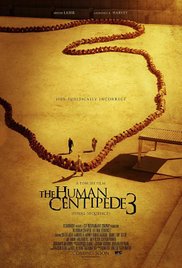
THE HUMAN CENTIPEDE III (FINAL SEQUENCE)
US, 2015, 102 minutes, Colour.
Dieter Laser, Laurence R. Harvey, Tommy 'Tiny' Lister, Clayton Rohner, Brie Olsen, Eric Roberts, Tom Six.
Directed by Tom Six.
The two Human Centipede films, written and directed by Holland-born, Tom Six, were well received by horror fans – but considered for too much in their conception, the visualising of the process of making human centipedes, reactions of revulsion and disgust at the physiological consequences to appeal to mainstream audiences.
For this Final Sequence, writer-director Tom Six has transferred to the United States with a prison setting.
It has to be noted that the fans of the first two films were not impressed by this one.
The governor of the prison is played by Dieter Laser, the doctor from the first film. Some sequences at the opening of the film, especially of gross sexual behaviour and abuse of the secretary (and there is more of this throughout the film, eliciting more disgust in response) give a tone to the film and the character of the prison governor. The way that the character is filmed, especially in close-ups and profiles of his face make him look and seem particularly reptilian. And, with his broken accent, often difficult to understand, he becomes one of the strangest of screen characters.
Laurence R..Harvey, who appeared in the second film, is his assistant at the prison. The lineup of prisoners all look from tough central casting with Tommy ‘Tiny’ Lister as a key prisoner. The governor is at his wits end as to how to control the prisoners – than resorting to castration with some ugly visuals to go with this decision. And this involves eating.
The assistant comes up with the idea after they have watched the first two films of making a human centipede with all the prisoners. There is a doctor, Clayton Rohner, who has been struck off but finds employment in the prison and who is willing to go along with the experiment.
In the meantime, there are various confrontations with prisoners, shootings, torture…
Then, the director arrives as himself, dark glasses, the touch of Dutch accent, his interest in the response to his films, discussing how authentic the original films were even though using special effects and persuades the governor and his assistant that the physiology and the surgery for making the human centipede is credible.
It has to be said that the human centipede is made only in the last 15 minutes of the film and is not nearly as visually horrifying as in the previous films, explanations with the touch of stomach-turning are given but all the prisoners, an enormous conga line for the human centipede are all dressed in prison uniforms with comparatively few close-ups.
These occur when the overall governor of prisons arrives – and, in fact, it is Eric Roberts in the role. He is presented with a parade of the human centipede, 500 prisoners, is told that this is the solution for all prison discipline, and that very little has been done physiologically to the prisoners so that they will not be in any way deformed on release (and an example is shown). He is repulsed and seems to be expressing many of the sentiments of the audience and their reaction to this kind of procedure and its consequences.
He drives off, the mad governor shoots the doctor, then shoots his assistant, when Eric Roberts returns – a change of heart, endorsing that this is definitely the way for prison discipline and control.
Not really a film to be watched.
Published in Movie Reviews
Published in
Movie Reviews
Tagged under
Saturday, 18 September 2021 20:00
Meet Joe Black
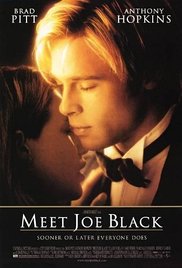
MEET JOE BLACK
US, 1998, 178 minutes, Colour.
Brad Pitt, Anthony Hopkins, Claire Forlani, Jake Weber, Marcia Gay Harden, Jeffrey Tambor.
Directed by Martin Brest.
This is long movie and moves at a leisurely, even grand or grandiose, pace. It is sumptuously designed and costumed. For those prepared to go with these decisions of the film-makers, it is a matter of surrendering to this story of a millionaire whose time has come to die and of Death who, before he takes his victim, wants to experience what it is to be alive.
With a Hollywood and audience preoccupation with angels and the afterlife during the 1990s, this is a story about being ready for death, for accepting one's life and venturing beyond it. Anthony Hopkins is a (good and nice) media magnate who comes to a greater realisation that wheeling and dealing is a very temporal and temporary activity. (He also has a very convincing heart attack scene.) Brad Pitt is photographed glowingly as a nice and breezy young man whose body Death appropriates for his journey among New Yorkers to find out about life. Claire Forlani is Hopkins' daughter and the main reason why Death chooses this particular environment.
Under the gloss and the desire to explore themes of death, some of the plot-lines (especially death's passion for peanut butter) are more than a touch corny, even sentimental. But, all in all, it is a meanderingly pleasing entertainment - with a message. It is a remake of the 1934 movie, Death Takes a Holiday, starring Fredric March (at only 78 minutes) which was remade as a telemovie in 1971 with Melvyn Douglas.
1. A film about death and love?
2. The idea of Death incarnate, body, male,, unaccustomed to human life, wanting to learn, getting to know people? Death coming for Bill and the old lady in the hospital?
3. The mansion, lavish interiors, the grounds? The business world, offices? The hospital, corridors, the wards? The cafe and the streets?
4. The musical score, the songs at the party, the lyrics corresponding to the action on screen… I only have eyes for you, anything goes…?
5. Bill, Anthony Hopkins, 65th birthday, the meaning of his life and achievement, his love for his wife, mourning her? Alison, older, organising the party, her marriage to Quinve? Susan his favourite? His relationship with Drew, the work? His being part of the family? The business career, media, discussions about the merger?
6. Susan, love for her father, the relationship with Drew, no passion? Her work as a doctor, at the hospital? Having a coffee, the charming stranger, talking, the effect on her, his leaving? The audience knowing about the accident, Susan not? Joe, appearance, a different person, yet her loving him?
7. Joe, Brad Pitt and the touch of the fey? The way he was photographed, his hair, suit, smile, courtesy? His arrival, his body, characteristics, talking with Bill, explaining the situation? Bill and his heart attack? The deal for secrecy? Joe and his presence at the meals, awkward? The clash with Drew? Going to the kitchen, with the servants, liking peanut butter? The lavish room? His language, vocabulary, learning?
8. Going to the Board meeting, Bill allowing him in, eating the cookies, Drew and his negative reaction? The issue, the merger? Bill and his refusal, supported by Joe, Drew’s reaction?
9. Drew, the meals, his anger with Joe, interrogating him? At the Board meeting, taxes and death? The revelation of what he was doing behind-the-scenes, with the merger, explanations to the Board? Gathering them behind Bill’s back, his explanations, getting Quince to talk, Joe as the adviser? The vote, the member-friend rebellin, talking with Bill? Bill’s arrival, the process of the meeting, the speeches, the vote, Bill being ousted? Quincey and his being upset, talking with Joe, urging him to be frank with Bill, his explanation, Bill’s understanding, calling Drew, the Board meeting and their listening on the phone? Joe as an IRS officer, the explanation of what Drew had done, tax dodging, the plan to split the proceeds from the merger? The vote of the board, Drew’s defeat?
10. Alison, love for her father, feeling loved by him, understanding favouritism? The meals and her happiness, the question of cake, her being upset? Bill and his eating the cake? The organising the party, the detail, the most lavish party? Its success?
11. Susan, Drew not liking her relationship with Joe? Joe falling in love, the kiss, the sexual encounter? Going to the hospital, the encounter with the West Indian lady, his return, the discussions, helping her to die?
12. Bill not wanting Susan to fall in love with Joe? His stern talk with her? Bill talking with Joe, the explanation, Joe realising that he wanted this love for himself, Susan not knowing who he was? Talking with Susan, agreeing to leave?
13. The party, the music, the visitors, cake, Happy Birthday song, Bill’s speech? Goodbye to Alison, to Susan, Joe waiting and the two going off? Joe’s comment that Bill had lived a good life?
14. The young man returning, not knowing why he was at the party, not remembering? Recalling the scene at the cafe, Susan appreciating who he was – and their walking off into the future?
Published in Movie Reviews
Published in
Movie Reviews
Tagged under
Saturday, 18 September 2021 20:00
Eskimo
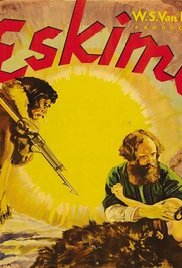
ESKIMO
US, 1933, 117 minutes, Black and white.
Edgar Dearing, Peter Freuchen, Edward Hearn, Joe Sawyer, Mala a.k.a. Kripik, (Ray Mala), Lotus Long.
Directed by W.S.Van Dyke.
In the late 1920s, documentary maker, Robert Flaherty, made a classic, Nanook of North, a film chronicling the lives of the Eskimo. At the same time, there were documentaries about the South Seas, including Moana and White Shadows in the South Seas.
This film, based on stories by writer Peter Freuchen, who appears in the film, was made during 1932 and 1933 on location, under the direction of the prolific W.S. Van Dyke, who was to make a great number of still popular in MGM films from the 1930s into the 1940s.
The black-and-white photography is authentic in the Arctic, in the snow and ice, in the villages with the igloos, as well as on the fur traders’ base. (A number of the sequences were re-enacted in front of rear projection scenery, looking very obvious now). The photography is striking for its time and the way that it was put together, its editing, and the first Oscar awarded for editing.
While many of the Eskimo, speaking their Inuit language in the film (having subtitles), a number of the leading roles are taken by actors, especially Mala, the hunter, played by a Canadian with Inuit background, Raid Wise, who appeared in a number of films using the name Ray Mala. The fur traders and the fishermen as well as the Canadian Mounties are played by actors who speak English.
The photography on location and the use of Inuit helped to give the film its semi-documentary tone.
Like the films of the South Seas, the film is critical of the coming of the white man, the attitudes of the whites in terms of exploitation, greed, using and abusing the local people. One of the fisherman is particularly loathsome, doing deals with Mala, encouraging the fishing and the hunting but taking Mahler’s wife, raping her, getting her drunk and letting her loose in the snow.
In come the Mounties, trying to establish some law and order, with justice for Mala against the fisherman. They travel with him, but their commanding officer is a by-the-book policeman and, while in some ways sympathetic to Mala and his violent reaction to the treatment of his wife, killing the fisherman, he still demands that the Mounties arrest him and bring him back to Justice.
This provides a long journey for the officials, interactions with Mala, trying to communicate in broken Inuit, understanding his code of ethics, his point of view, prepared to let him go.
So, the film serves as an indictment of western colonialisation of these frontiers, the attitude of those who went in, the motivations of greed which led to violence and exploitation, and the victimisation of the local people, inducing them to trade for guns, which had many deadly repercussions for them and their culture.
A film worth seeing for its presentation of the Inuit and the whites but also a means of becoming aware of what consciousness there was at this time in Hollywood, of the repercussions of this kind of colonial exploitation.
Published in Movie Reviews
Published in
Movie Reviews
Tagged under
Saturday, 18 September 2021 20:00
Men in White
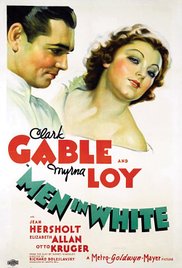
MEN IN WHITE
US, 1934, 74 minutes, Black and white.
Clark Gable, Myrna Loy, Jean Hersholt, Elizabeth Allen, Otto Krueger, Wallace Ford, Samuel S.Hinds.
Directed by Richard Boleslawsky.
Men in White is one of the earliest of the very popular genre of hospitals, doctors and the crisis they face.
It is a star vehicle for Clark Gable who had emerged in the previous four years as a character actor but also as a star. The film was released at the same time as his Oscar-winning It Happened One Night. Gable was to go on to more significant roles including the next year’s Mutiny on the Bounty as well as Gone with the Wind.
Myrna Loy was also emerging as a star at MGM, in many light comedies but, especially her many films with William Powell and the Thin Man series.
Jean Hersholt was a strong character actor at the time and Elizabeth Allen, from England, was to appear in Mark of the Vampire as well as A Tale of Two Cities, returning to England and appearing in such films as Graham Greene’s The Heart of the Matter in the early 1950s.
1. A popular film of the early 1930s, focusing on medicine, doctors and their dedication?
2. The hospital setting, surgery, the wards? The contrast with society life? Musical score?
3. The focus on George, a Clark Gable character, a talented doctor, working long hours, the range of patients, the little girl and his orders and the older, arrogant doctor, changing them and the consequences for her, George’s promises to her parents? His admiration for Dr Hochberg, hoping to go to Europe to study, the question or his relationship with Laura, her demands, phone calls, dates, his sudden becoming free, her surly response, coming to see him, the significance of the assistant nurse, George’s relationship with her, her illness, Laura befriending her, her death? George going to Europe? Laura allowing him to go – with some hope for the future?
4. Dr Hochberg, his expertise, his years of medical service, going back to the 1890s? His influence on George? On Laura?
5. Dramatising medicine and surgery in the 1930s – and in appreciating the range of changes in medical practice, which are mentioned, over the decades?
6. The touch of humour with Shorty, borrowing the clothes, the date…?
7. The nurse, her devotion, from England, working with George, the attraction, the relationship, her illness, the death?
8. A blend of melodrama with a tribute to the medical profession of the time?
Published in Movie Reviews
Published in
Movie Reviews
Tagged under
Saturday, 18 September 2021 20:00
Vvitch, The: A New England Folktale
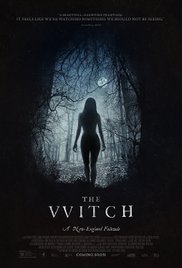
THE VVITCH: A NEW ENGLAND FOLKTALE
US, 2015, 93 minutes, Colour.
Anya Taylor- Joy, Ralph Ineson, Kate Dickie, Harvey Scrimshaw, Ellie Grainger, Lucas Dawson.
Directed by Robert Eggers.
The title and its tone seems to indicate one of those horror/history tales of witchfinders and persecutions as well as dire presentations of witches and their sinister behaviour.
Not the case.
The helpful clue is given in the subtitle of the film, A New England Folktale. At the end of the film, the writer-director, Robert Eggers (his first full-length feature film and winner of the Best Director award at Sundance 2016) informs the audience that his screenplay draws on memoirs, diaries, reports and court proceedings from the period, the time of the witches of Salem, the end of the 17th century in New England.
Most of the cast in the film are British, Ralph Ineson as William, patriarchal figure expelled by the authorities for usurping his role as a Christian preacher and exiled to the forest, along with his wife, Kate Dickie, and his four children. The scene in the tribunal is reminiscent of those scenes in such films and plays as The Crucible.
Life in the countryside of this British colony is harsh indeed, a hut with no comforts, a barn, corn crops, the chopping of wood, two goats for sustenance.
The oldest of the four children is Thomasin (Anya Taylor- Joy), on the verge of adolescence, the good girl, with spirit, but, through circumstances, suspected of being a witch. Her younger brother, Caleb (Harvey Scrimshaw) is reliable, working on the farm, his parents devoted to him. On an excursion into the woods, the hunting dog sees a rabbit and pursues it, Caleb following, but experiencing something sinister in the woods, involving a mysterious young woman with a red cape and clawlike arm and hand.
This ferments the religious beliefs and superstitions about witches and about the hand of Satan. It is compounded by the mischievous little twins and their playful attacks on Thomasin, accusing her of being a witch. A test of prayer shows Thomasin able to pray but the twins not being able to remember the words of the Lord’s Prayer. Nevertheless, she is not believed.
The parents try to cope, relying on their straightforward faith, their attempts at prayer, belief in Jesus Christ, belief in Satan, and a belief that evil can infiltrate into the human in the form of a witch.
The film takes its audience right into the life of these impoverished people of the time, the details of life on the farm, the hardships in relationships, the dominant father, patriarchal, yet devoted to his children, the mother, still yearning for England, hardened and wizened by her difficult life.
There is no easy outcome given this religious framework, the entrenched beliefs, the fears and superstitions, the inability to discern where good lies and where evil exists, the tragedy that pervades devout families, but seem especially in this period in New England.
1. An atmospheric film? American history? The 17th century, religion and witchcraft?
2. Re-creation of the period, costumes and decor, the church, the colony, the countryside, remoteness, the village, homes and farm, the woods? The musical score?
3. The title? The 17th century in Massachusetts and belief in witchcraft? The religious grounding? The origins of the film in documents, memoirs, court proceedings?
4. The opening, William and his family, the tribunal, the condemnation, accusations of presumption in preaching the Gospel? His being exiled? Taking his wife and children?
5. The journey into the countryside, the forests, the fields, choosing the site of a home on the farm?
6. The building of the farm, the crops, the hard work? Fields, chopping the wood? The interiors of the house, sparse? Lighting? Food?
7. William, his personality, tall and strong, long hair and beard? His religious beliefs? Work? Catherine, hard life, yearning for England, the relationship with her husband, with her children? The hard work?
8. The children, ages, Thomasin, becoming an adolescent, the family of relying on her, her manner, charm? Caleb, his age, working hard on the farm? His mother devoted to him? The twins, young, playing, mischievous? The goats, work with the goats?
9. Caleb, going with Thomasin on the horse, dog, seeing the rabbit, the chase, Thomasin falling from the horse? Caleb pursuing the dog, finding it dead? Calling out, the hut, the smoke, the young woman emerging, the red hood? Her kissing Caleb and infecting him? The witch’s hand and arm?
10. Disputes between husband and wife concerning searching for Caleb, the lack of a horse, Thomasin’s return, the suspicions of her? Prayer, religious statements? Beliefs?
11. Caleb and his returning, fever, bewitched, lying on the bed, the episode, the apple emerging from his mouth? After almost choking? The mother, her relief, watching him, tending him, his dying? Grief-stricken?
12. The twins, their carry on, accusing Thomasin being the witch, their tantrums, the collapse, been boarded up with Thomasin?
13. Thomasin, accused of being a witch, her father making her pray, her ability to pray, the twins not able to pray? The father, his relentless boarding the children up?
14. The father, his confession to his wife about his shortcomings? Her confession to him about wanting to go back to England and not fulfilling her duties to him?
15. The role of the goats, superstition, satanic, the death of the white goat?
16. The attack on William, the black, Satanic goat goring him? The mother, her attack on Thomasin, Thomasin and the knife, killing her mother?
17. The nature of faith, in this pioneering life, relying on prayer, faith in Jesus, wariness of Satan, the drawing of biblical beliefs, and the devastating consequences, especially with the belief in witchcraft?
Published in Movie Reviews
Published in
Movie Reviews
Tagged under
Saturday, 18 September 2021 20:00
Peacemaker, The
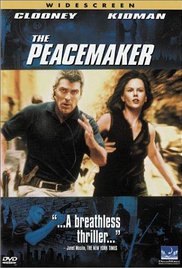
THE PEACEMAKER
US, 1997, 124 minutes, Colour.
George Clooney, Nicole Kidman, Marcel Iures, Alexsandr Baluev, Randall Batinkoff, Jim Haynie Armin Mueller Stahl.
Directed by Mimi Leder.
The Peacemaker is a political thriller of the 1990s. the setting is the aftermath of the wars in the Balkans as well as the collapse of the Soviet Union. It anticipates such thrillers of the coming years as Tom Clancy’s The Sum of All Fears.
The film opens with quite an elaborate stealing of nuclear warheads by a rogue Russian general, capitalising on the corruption in Russia during the 1990s, willing to sell the warheads. He organises a train to transport the warheads, killing the military guard as well as a young officer complicit in the stealing. He then organises for road transport by truck through southern Russia and the republics to the Iranian border.
Nicole Kidman plays Dr Julia Kelly, an expert in Soviet affairs and nuclear warfare, adviser to the President, invited to brief the authorities about the warheads. She wants a military liaison and is given this in the form of George Clooney, one of those free spirits in the military willing to take all kinds of risks. He proves that action in the field, especially co-co-action, provides more experience than the theories of the Pentagon. Armin Mueller Stahl plays a colleague in Russia.
Using all kinds of intelligence, satellite photos, computer information, the couple are able to find the company trucking the warheads, pinpointed on the highways and eventually sending helicopters to destroy it. But, a rogue Serbian has stolen one, giving it to his politician brother so that a demonstration may be made at a meeting of the United Nations.
This means a climax in the streets of New York City, streets been cordoned off, police, examining people with backpacks, snipers in the trees and a countdown to the explosion of the nuclear warhead and a confrontation in a church.
The film was directed by Mimi Leder who made another disaster film at this time, Deep Impact.
1. A 1990s thriller? The collapse of the Soviet Union? Nuclear warheads, exploitation, the Balkans and political threats?
2. The international settings and filming on location, Bosnia, Russia, the Russian republics? Military bases, trains and train lines wrote in trucks, refugees, mountainous terrain? United States, New York City? Washington and the Pentagon? The musical score?
3. The opening and setting of the mood? The nuclear warheads, on the train, the general and his motivations, the young officer being complicit, the two trains, the murder of the troops, the leaping from one train to the other, the diversion of the train, the crash and the devastation? The escape with nuclear warheads? Their being transferred to trucks, the drive south from Russia to the Republics, to the border with I ran? The risks and threats?
4. The background of the collapse of the Soviet Union, dissatisfaction, loyalties? Corruption? Selling the nuclear warheads?
5. Sarajevo, the religious ceremony, the murder of the politician by his assistant, the loyalties to Dusan, Dusan and his secondment to power, his playing the piano with his student, by himself, his contact with his brother? His brother in the truck, the bombardment, stealing the nuclear warhead, his escape, meeting his brother, the plane, the plan for New York and the United Nations?
6. Dusan, as a person, his motivations, the visuals of the death of his wife and daughters, his tape and his explanation for his action? Diplomatic immunity, taking the warhead on the plane, looking at New York, his assistant and his brother in New York? The taxi, being held up by the police because of the pack, his assistant and his brother shooting, his escape in the streets, their deaths, going to the church, the confrontation between Tom and Julia, the setting of the bomb?
7. Julia, the role of the Pentagon, advisor, contact with the President, her information about the stealing of the nuclear warheads, the train crash? Her briefing to the authorities? Her wanting military liaison, someone who would take orders from her? Tom, present in the briefing, asking the questions, his information about those leaping from train to train, the time gap between explosion in crash? His shrewdness?
8. Tom, his background, the hearing, his contacts, bribes and extending American goodwill? His self-confidence? Experience in the field rather than Julia’s theories? His beginning to take over, Julia having to listen to him? The uneasy working together? His contact with Dimitri, Dimitri in Europe, information, checking with the authorities?
9. Tom and Julia going to Europe, the meeting with Dimitri, the information, the car pursuit, his being killed?
10. The information about the trucking company, the financial background and working out which company, going to the office, the visual check, the confrontation with the head, threatening him, tying him up, the computer and getting the information? The realism of the car chases and crashes? The clue of 44 E?
11. Getting the information to the American authorities, persuading Julia to authorise the helicopters? Pinpointing the truck, phoning the general, knowing his background and his potential indictment for corruption? Frightening the general, his pulling the truck out, going through the crowd of refugees from the war with Armenia?
12. Tom, helicopters, the Russian authorities, the threats, arming the missiles, firing them, one helicopter being shot? Going behind the mountain? The attack on the truck? The struggle in the truck, Dusan’s brother stealing the warhead and escaping? Tom and his descent into the truck, the fight? Being edged out? The hook and getting the warheads? The man dangling and his giving the information? Finding that there were was another warhead missing?
13. Julia, reaction to those who died in the crash?
14. Julia, the considerations about Sarajevo, the raid on the house, finding the video, Dusan and his explanation of his action? Intended after the action? The United Nations, 44 E, flying to New York?
15. Tactics in New York, cordoning off the streets, examining the backpacks, security? The snipers? Tom and Julia urging the shooting of Dusan, the risks with civilians, the woman being shot? The excitement of the pursuit, the role of the police, Dusan and his brother and his assistant, being shot, his going into the church, wounded, the explanations to Tom and Julia?
16. The diffusing of the bomb, the short time, Julia and her understanding, undoing the screws, the casing for the nuclear bomb, leaping
out of the church window, the explosion, only the casing?
17. Julia swimming as in the beginning, Tom coming, suggesting the drink? Mission accomplished?
Published in Movie Reviews
Published in
Movie Reviews
Tagged under
Saturday, 18 September 2021 20:00
Trumbo/ 2015
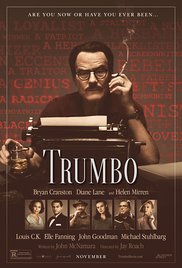
TRUMBO
US, 2015, 124 minutes, Colour.
Bryan Cranston, Diane Lane, Elle Fanning, Helen Mirren, Louis C.K., Alan Tudyk, David James Elliott, Richard Portnow, Roger Bart, Adewale Akkinuoue- Agbaje.
Directed by Jay Roach.
The title might seem a mysterious name – except for those who are film buffs or who are film students. Trumbo is the name of screenwriter Dalton Trumbo, a significant figure in Hollywood in the 1940s, socialist leaning and joining the Communist Party during World War II, when the USSR and the US were allies. But, with the end of the war, the coming down of the Iron Curtain and militant patriotism taking hold of the American public as well as of the American Congress, it was “Un-American” to have been a member of the Communist Party. Trumbo became a victim of the investigations and hearings, and was blacklisted for over a decade.
Playwright Lillian Hellman called this period “Scoundrel Times”. In retrospect, from 1947 throughout most of the 1950s, a number of people in public office, including Vice-President? and later, President, Richard Nixon, participated in hearings, including investigations about the Hollywood film industry, pressurising people to profess their loyalties and to name names. Perhaps the actors and directors featured in Trumbo have become part of Hollywood history and the impact of their patriotic statements does not make such an impact today, but there was a divide and many reputations were lost and a great number of actors, writers, producers and directors were not able to work for many years.
This background is made clear in this film. As is the ultra-Conservative and patriotic stances of some of the Hollywood personnel. Here, one of the main upholders of the right is John Wayne. But one of the principal crusaders is the gossip columnist, Hedda Hopper, powerful with her widely read columns, played intensely with destruction aforethought by Helen Mirren. There are clips from a number of actors, especially those denouncing, with images of Ronald Reagan, Robert Taylor, Sam Wood. Others, like Gregory Peck and Lucille Ball overheard in radio clips supporting the alleged communists, or like Humphrey Bogart and his wife, Lauren Bacall, seen in many demonstration scenes. Some were pressurised like Edward G. Robinson.
But, the focus of this film is Dalton Trumbo, play convincingly, sympathetically but not underestimating his ego and his demanding nature, by Breaking Bad’s Bryan Cranston. It is very interesting to see Cranston breaking from his TV series to this kind of serious performance, Oscar-nominated. The support of his family and a variety of sequences are convincing because of the presence of Diane Lane as his long-suffering wife and Elle Fanning as his oldest daughter.
The span of the film is 1947 to 1960 with a postscript to 1970 and an award from the Writers Guild of America. Further information is given in the final credits with a number of photos and radio and TV excerpts.
Early in the film, Trumbo is the leader of a group of writers and directors who had affiliations with the Communist Party who band together to try to deal with the hearings by Congress, preserve the values of the First Amendment, risk being held on contempt and jailed – which does happen to a number of them, known as The Hollywood Ten. Trumbo spent a year in jail in Kentucky, ironically sharing prison time with J.Parnell Thomas, his principal interrogator who was found guilty of tax fraud and jailed. One of the main interrogators in the early 1950s was Senator Joe Mc Carthy – but the film shows him only briefly.
The latter part of the film shows how Trumbo survived professionally and financially, albeit undercover, by writing screenplays like Roman Holiday for which he won Oscar, though it was attributed to Ian Mc Clellan Hunter (Alan Tudyk) a close friend. He then worked for the King Bros (only two of the three present here, played by John Goodman and Stephen Root) writing small budget quickie movies or being a script doctor on many screenplays, involving a number of his friends in similar kind of work, including Arlen Hird (Louis C.K.). One of the projects dear to his heart, The Brave One, then won him another Oscar although under the name, Robert Rich.
Trumbo, unlike others, lived to see his vindication, supported by Kirk Douglas in getting him to write Spartacus and, especially, director, Otto Preminger, not only getting him to write Exodus but deciding to put Trumbo’s name on the script and publicising this in a press conference, something which Kirk Douglas followed with Spartacus.
The film was directed by Jay Roach who, early in his career, directed the Austin Powers series as well as the Meet the Parents series but who moved to more serious films with about the 2000 presidential election in Florida, Recount, and Game Change and about Sarah Palin and the 2008 Republican campaign.
The anti-Communist fervour of the period offers a lesson in the effect of extremist political and social stances, victimisation of people, so many innocent, and the dangers of any kind fanaticism – something featured in the 2015-2016 campaigns for US presidential nominations, especially the campaign of Donald Trump.
1. An interesting drama, history, Hollywood, communism, the blacklist, the hearings? The consequences for writers, actors, the fronts? Final success for Dalton Trumbo?
2. Hollywood in the 1940s and 50s, the culmination in 1960? The House Un- American Hearings? Congress and contempt? Prison? The studios, Hollywood society, suburban homes? The musical score?
3. The LA locations, Hollywood, Washington, the suburbs, prison? The musical score? The music of the times?
4. The history recapitulation, the USSR, World War II, LA with the US post-war ideologies and membership of the Communist Party, the change post-war, suspicions, the Iron Curtain and the Cold War? The reaction of the militant right, patriotism? Officials like Richard Nixon? The enthusiasm and bigotry of the person in the street? The authorities and the hearings? Studio heads like Louis B. Mayer, stars like John Wayne, Robert Taylor, directors like Sam Would? The militancy of columnist, Hedda Hopper? The glimpse of supporters of the blacklisted, voices of Gregory Peck and Lucille Ball, the presence of Humphrey Bogart Lauren Bacall? The experience of pressures?
5. The Hollywood 10, leading to the blacklist? The government, the denunciations, testimonies, the willing witnesses? Dalton Trumbo as the leader of the group, 17, some dropping out? Speaking at the hearings, J. Parnell Thomas, discussions of the first Amendment, risking careers, finance, prison? The group meeting, the discussions, the personalities? Idealism and consequences, prison?
6. Trumbo as a person, Bryan Cranston, his Oscar nomination? His relationship with his wife, his children, the years? His writing, successful films, reputation? His honesty and directness, his support by his wife and children? Prison? The experience in prison, at work, relationships? Being denounced and patriotic taunts of the prisoners? Arlen Hird, friendship and dislike, discussions, ideals, Hird and his cancer, deciding to stand by Trumbo?
7. The work in prison, doing the accounts, the racial clash, ideologies, getting out?
8. His life after prison, the King Brothers, their personalities, second-rate films, posters, interview, writing scripts, doctoring screenplays? Writing in the bath, seclusion, the scene with the birthday party and his abrupt response to Nicole? Getting jobs for the other writers with the King Brothers?
9. The friendship with Ian Mc Clellan Hunter, the discussion about the credit for Roman Holiday? The agreement? Payment? Winning the Oscar, the family joy?
10. The hard years, isolation, the effect on the writers?
11. Hedda Hopoper, as a personality, fashions and hats, the influential column, threats and career blackmail, patriotic, her son, about boys fighting in Korea…? The work with John Wayne, John Wayne and his office, Association, testimonies? The threats to Mayer and his cancelling Trumbo’s contract? Her confronting Trumbo? Her friendship with the interviewer at House Hearings? Her reigning supreme – but the final scene of the defeat?
12. J. Parnell Thomas, his role at the hearings, attacks, his being in jail, tax and fraud, the same jail as Trumbo? The glimpse of Senator Mc Carthy?
13. The idea for The Brave One, writing, production, winning the Oscar? Anonymous. Robert Rich?
14. The role of Kirk Douglas, Spartacus, wanting the rewrite, the visit to the house, the limited time, having his name on it – and the impact of seeing clips from Spartacus, illustrating Trumbo’s writing, illustrating Trumbo’s writing?
15. Otto Preminger, strong, arrogant, the visit, the proposal, to write Exodus? Satisfied? The announcing that Trumbo’s was to be name on the screen?
16. 1960s, family, their continued support, his success?
17. 1970, the speech and the award from the Writers Guild? Receiving his Oscar? Achievement and integrity?
18. Further information at the end about the scoundrel times, photos and the clip from Trumbo’s speech?
Published in Movie Reviews
Published in
Movie Reviews
Tagged under
Saturday, 18 September 2021 20:00
Mark of the Vampire
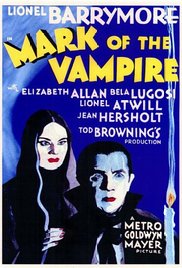
MARK OF THE VAMPIRE
US, 1935, 68 minutes, Black and white.
Lionel Barrymore, Elizabeth Allen Them, Bela Lugosi, Jean Hersholt, Henry Wadsworth, Donald Meek.
Directed by Tod Browning.
1931, Tod Browning made the classic Dracula, Bela Lugosi as the vampire. Browning continued to make such films as Freaks and Devil Doll, the latter with.Lionel Barrymore.
This is a contemporary vampire story, explicitly mentioning 1934. Much is made of the mythology of vampires, appearing as bats, punctures and draining blood, sleeping during the day… Much is made at the beginning of the film about superstitions, with local villagers cautious and praying and a tourist couple sceptical about everything.
The lord of the castle is killed, with punctures, drained and the.police chief is called in who is sceptical of vampires. A Professor is also called in who is well informed vampires, Lionel Barrymore. The daughter, Elizabeth Allen, in her grief in it seems to be led on by the vampire Count and his assistant. Her fiance also has puncture marks on his neck.
Also in the picture is Baron Otto, Jean Hersholt, who has inherited.care of the daughter. Various investigations, the professor hypnotising the Baron, his reliving the crime and the revelation that he had done the murder wanting to marry the daughter.
Very creeky, but entertaining, and the surprise twist at the end with Bela Lugosi and the revelation that he is impersonating the Count as a vampire!
1. A vampire film with a contemporary setting, 1934?
2. The vampire traditions, Bela Lugosi appearing on Dracula in 1931? Bram Stoker’s Dracula from 1897? Beliefs, superstitions, rational responses?
3. The village setting, castle, the visitors and their hearing about vampires? The locals and fears, prayers, rituals, superstitions?
4. The finding of the bodies, punctures, drained of blood? The vampire marks? Victims in the woods? Irina and her fiance, Irina herself?
5. The household, the servants, Baron Otto, his concern about his ward, the father and his will, administrator?
6. The Inspector, the investigation, the interrogations, rational, suspecting murder?
7. The professor, his being called in, his expertise, manner, interrogations, his working with the Inspector, his belief in vampires, his explanations?
8. Bela Lugosi as the Count, his assistant, echoes of Dracula, appearance, sinister, leading Irina?
9. The continued investigation, in the basement, the Baron afraid, the Professor and the body of the Count?
10. The behaviour of Irina, upset at her father’s death?
11. The revelation of the setup, the pretence, not telling the fiance, still grieving father’s death, the assistant brought in to impersonate her father, the inspector knowing what is happening, the Professor hypnotising the Baron, the re-enactments, pretending to make the vampire marks, capitalising on the reality of vampires in the district?
12. The joke at the end, the Count and his assistant as carnival actors and Lugosi saying that he would incorporate this performance in future acts?
Published in Movie Reviews
Published in
Movie Reviews
Tagged under
Saturday, 18 September 2021 20:00
10 Cloverfield Lane
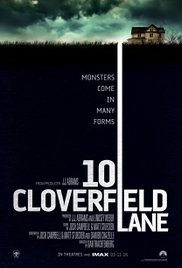
10 CLOVERFIELD LANE
US, 2016, 103 minutes, Colour.
Mary Elizabeth Winstead, John Goodman, John Gallagher Jr.
Directed by Dan Trachtenberg.
Cloverfield was one of those hand-held camera thrillers with handheld camerawork and found footage, pseudo-documentary, about violent threats to communities and fightback.
The only connection with this film is the reference to that title and its director, Matt Reeves, who is one of the producers of this film (as is Drew Goddard, writer of The Martian and Damien Chazelle, director of Whiplash).
In terms of photography and style, this is a more straightforward piece – although, there is some hand-held camera work in the final, very busy and active, part of the film.
It also should be said that this is more a terror film rather than a horror film (though there are touches of horror in that final part).
Most of the film is a claustrophobic drama with only three characters. We see Michelle, Mary Elizabeth Winstead, packing up, driving away, ignoring her boyfriends pleas on her car phone. At this stage during the credits, we are rather lulled until there is a sudden, quite a sudden shock and the film story changes. (There are a couple more of those sudden shocks.)
Michelle finds herself in a subterranean cell, well stocked by Howard who has built it as protection against the alien invasion. He is a big, jovial man, played by John Goodman. Michelle is a bit wary about him, needless to say, wanting to get out, and we, the audience, do have suspicions as to whether there really is an alien invasion – although, some evidence is gradually revealed.
Also in the underground bunker is a local young man, Emmett, played by John Gallagher Jr. He and Michelle share their stories, wondering about Howard, but gradually forming a little community, perhaps the only survivors of the invasion.
But, all is not always well, Michelle making some discoveries, Emmett concerned, and Howard, big and bombastic, genial, but…
And all this works up to a climax and confrontation between the three, probably not quite as expected, but making the film more engrossing after life in the bunker. And, then, there is that finale with the spacecraft and alien monsters. Which, by this stage, has become credible enough.
Will the aliens take over? Will Michelle, whom Sigourney Weaver’s Ripley from the Alien series would be very proud of, elude pursuit and survive? Are there any other survivors? The success of this film may well indicate that the story could continue.
1. The title, application of Cloverfield? The terror/horror/aliens film?
2. Louisiana, the roads, the crash? The bunker, the cell, the interiors as normal, furnished, mod cons? The vent in the crawlspace? Claustrophobic? The experience of the abduction?
3. Outside the bunker, the rumblings, the shakes, and eerie atmosphere, dusk, the fields, the buildings, the crops, the roads, the spacecraft and aliens? The musical score?
4. The decision to use conventional photography – later hand-held material? Editing, shocks? The use of songs?
5. Michelle, in herself, seen packing, leaving, driving, Ben on the phone, his pleas, cutting him off? The sudden crash? Waking, her leg encased, the chains? Howard, bringing breakfast, her breaking free, the effect? Fright, survival, begging Howard to be free? Her back story, the discussions with Emmett, sharing the storage with him? Listening to the stories of the Howard and Megan, Paris? Wary, discovering the truth? Preparing the gas mask and suit, Emmett’s death, the confrontation with Howard? The aliens, and seeing the bloodied woman, fixing the air-conditioning? Settling down, like a family?
6. The outside, the woman with blood, at the door, Michelle with the keys?
7. John Goodman as Howard, his age, imposing, chaining Michelle, his explanations, saving her? Wanting her to heal? Her hitting him, the stitches? The growing trust? His story about Megan, his daughter? The photo? Stories of Paris? Emmet saying that this was not Megan but a local girl who disappeared? His treatment of Emmett, knowing him, the neighbour? The songs and the music, jukebox, watching television, Pretty in Pink? The games, playing, the puzzles?
8. The air filtration, the crawlspace, Michelle going in, fixing it, finding the earrings, the scrawl for help? Her suspicions, designing clothes, ready for the gas mask and suit? Howard and his catching Emmett with the scissors, the corrosive vat, Emmett and his story about the gun, the explanation, his suddenly being shot and into the vat?
9. Michelle and Howard together, continuing to make the suit, hiding it, the vent and the screw, Howard discovering the truth, Michelle’s attack on him, spilling the vat, the creation of the fire, Howard and his destruction, the knives in the vent, Michelle pushing him down?
10. Outside, the birds and the chirping, the abandoned cars, the crops, the farm buildings? The explosions, fires? The spacecraft? Explosions? The alien monsters? Pursuing Michelle, her using her wits, survival, in the car, evading, creating the fire, the exploding the monster?
11. In the car, hearing the radio, the survivors, the decision to go to Houston?
12. The transition from an abduction to a claustrophobic film, with suggestions about aliens, but culminating in the invasion and the fightback?
Published in Movie Reviews
Published in
Movie Reviews
Tagged under